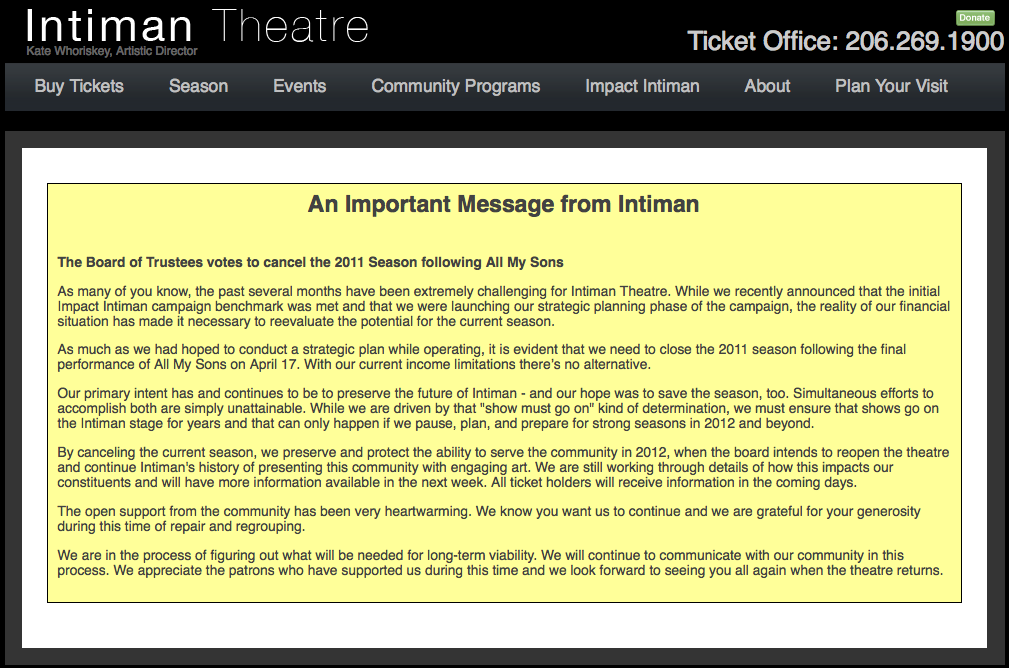“I’m a little dumbfounded,” I wrote Bruce Bradburn, Intiman’s board chair, “that there’s not been a full public accounting prior to what sounds like a praiseworthy attempt to reinvent the theatre artistically.”
I’d just read Misha Berson’s story in the Seattle Times, on Intiman’s plans to reopen with Andrew Russell at the helm (while wishing Berson had asked a business reporter to collaborate):
Russell’s goal for 2012 is to establish a loose collective of playwrights, directors, actors, designers and others to devise projects for Intiman to produce, in a short “micro-season” mounted next summer.
Russell came to Intiman in 2009, from New York, to take the position of Associate Producer; he also conceived and directed The Thin Place, a show that was more interesting, I think, to talk about later than to sit through. More recently he staged the Seattle Men’s Chorus production of Jake Heggie‘s For a Look or a Touch, a work originally commissioned by Seattle’s Music of Remembrance.
Still, nothing in the announcement of Russell as consulting artistic director cast new light on how Intiman planned to reinvent itself as a company that wouldn’t financially crash and burn in spectacularly public fashion. Last fall, Intiman’s managing director left abruptly, a substantial amount of debt was “discovered,” and a desperate fundraising drive’s “success” was followed by the news that Intiman would close its doors.
While initially the Board claimed that it was “Shocked! Shocked!” at this evident gambling with Intiman’s financial future, it also developed that at least part of the Board had approved spending down millions of dollars from Intiman’s endowment over the past few years (it’s now been entirely spent on retiring debt).
The decision to hire Russell as consulting artistic director is a very preliminary step, Bradburn told me. In October, the full plan for the theatre will be revealed. That’s when Russell and the Board will present their artistic and business strategy to arts funders and to the Seattle Center, which remains on the hook for rent for the Intiman Playhouse. (Bradburn also disputed the accuracy of some of the points I raised in my email–though of course the Board has yet to release an official audit of the crisis, which would make accuracy a little easier to come by.)
With these early details, you get the impression that Intiman plans to follow in ACT Theatre’s footsteps, which is not surprising since they’re being advised by consultant Susan Trapnell, author of ACT’s near-death turnaround. In particular, Intiman may become as much a hosting venue as a self-producing one, though (since Intiman doesn’t own the Playhouse) it remains to be seen if that’s as financially helpful as it is for ACT Theatre.
Another thing that may strike loyal Intiman-goers as strange (besides the members of the original “hold-up gang” appearing to circle around for another run at them) is the emphasis on how this reinvention is a return to Intiman’s core identity and roots.
The announcement makes reference to Intiman’s history of “staging innovative work and attracting a loyal following of patrons committed to exploring contemporary topics through the lens of epic stories”–“contemporary” and “epic” have to be precisely the wrong words. Simply put, Intiman was Seattle’s home for classic plays, with the space’s intimacy trumpeted in the very name.
That’s troubling because if there’s a tendency I’ve seen in this Board, it’s a willingness to believe their own spin even as it divorces itself from a reality apparent to everyone else. Break from a classics tradition if you’d like, just don’t claim that it’s not a break.
Russell told Berson that “one of the main things the board learned” from the crisis was the need to be “financially viable and artistically robust. We’d become a leaner and more nimble organization, more pay-as-you-go.”
That sounds good, but it is boilerplate that anyone on the Board could have produced for you before that last crisis–no one sets out to be artistically non-viable and artistically frail. What matters is actual practice. The group of people in charge of Intiman’s “financial viability” is the same group that oversaw the Intiman that spent itself out of existence. How they have developed a new concept of viability while being unable to divulge how Intiman reached outright closure is a mystery fit for the stage.

